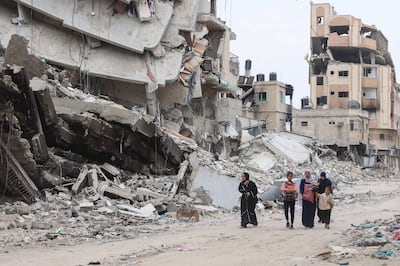Hamas said on Tuesday that the Israeli proposal it received from Qatari and Egyptian mediators did not meet any of the Palestinian factions’ demands.
However, the group said in a statement that it would study the proposal, which it called “irreconcilable,” and submit its response to the mediators.
A Hamas spokesman told Reuters on Monday that the group had rejected an Israeli ceasefire offer made at talks in Cairo, and Israeli Prime Minister Benjamin Netanyahu said a date had been set for an incursion into Rafah, the last safe haven for displaced Palestinians in Gaza.
Israel has said it is seeking a “prisoners for hostages” agreement under which it would release a number of Palestinians imprisoned in its jails in exchange for hostages in Gaza, but it is not prepared to end the military offensive before the Rafah invasion.
Hamas wants any agreement to guarantee an end to Israeli bombardment, the withdrawal of Israeli troops from Gaza and the return of displaced people to their homes across the enclave.
On Monday, after Israeli troops withdrew, stunned Palestinians found their hometown of Khan Younis in southern Gaza unrecognisable as they sneaked in to salvage what they could from the massive destruction.
Thousands of buildings had been destroyed or damaged, and families struggled to find their homes in streets bulldozed, surrounded by rubble and debris that had once been apartment blocks and businesses.
Magdy Abu Sahrour was shocked to see his house in Khan Younis flattened. He said, standing in front of the rubble:
I couldn’t find my home because of all the destruction. Where is my place, where is my home?
Many of the thousands who came to Khan Younis by foot and on donkey carts on Monday have been sheltering in Rafah. The withdrawal gave them a chance to see the wreckage of their homes and retrieve some possessions. But with the city now unlivable, they said they had little immediate chance to return.
An estimated 55 percent of the buildings in the Khan Younis area – around 45,000 buildings – have been destroyed or damaged, according to Corey Scher of the City University of New York and Jamon Van Den Hoek of Oregon State University, two mapping experts who have been using satellite imagery to track destruction.
Meanwhile, Nicaragua has sued Germany at the UN International Court of Justice (ICJ) for violating the Genocide Convention after it continued to provide military and political support to Israel.
The Nicaraguan delegation presented its case in a two-day hearing on Monday, accusing Germany of “facilitating the commission of genocide” and calling on the court to halt German arms exports to Israel and restore funding to UNRWA.
In his opening remarks to the court, Nicaraguan Ambassador to the Netherlands Carlos Jose Arguello Gomez said:
By continuing to support Israel, Germany is failing to fulfill its own obligation to prevent genocide or to ensure international humanitarian law is respected.
Nicaragua said the court should impose five interim measures, including suspending German aid to Israel, including military aid, and overturning the decision to stop funding UNRWA.
Due to the rapidly deteriorating humanitarian situation in the Gaza enclave, the delegation considers these measures “increasingly urgent and necessary.”
Germany, whose lawyers will present the delegation’s defence on Tuesday, denied the accusations. After the hearing, German legal representative Tania von Uslar-Gleichen called Nicaragua’s presentation “extremely biased.”
Nicaragua argues that Germany was fully aware from the start of the war that Israel was violating international law in Gaza and that the violations amounted to genocide following the International Court of Justice’s 26 January ruling, which found a “plausible risk” of genocide in Gaza.
France, Egypt and Jordan on Monday jointly demanded a “permanent” and “unconditional” ceasefire in the Gaza Strip and a two-state solution to the Israeli-Palestinian crisis.
In a joint Le Monde opinion piece, French President Emmanuel Macron, his Egyptian counterpart Abdel Fattah el-Sisi and Jordan’s King Abdullah II call for an end to “the war in Gaza and the catastrophic human suffering it causes.” The three heads of state wrote:
Faced with the intolerable number of victims, we, the heads of state of Egypt, France and Jordan, demand the immediate and unconditional implementation of United Nations Security Council Resolution 2728.
That was a reference to the UN resolution adopted last month demanding a ceasefire during the month of Ramadan and that Hamas release all Israeli hostages.
The article called for a two-state solution as “the only credible option that guarantees peace and security for all and ensures that neither Israelis nor Palestinians will have to relive the horrors that have befallen them” since Hamas attacked Israel on 7 October, when militants brutally killed 1,200 Israelis and took hundreds hostage.
The three leaders also warned of “dangerous consequences” if Israel launches a planned offensive on Rafah, a town in southern Gaza where more than a million Palestinians are sheltering from Israeli bombardment.
Israel’s indiscriminate air and ground offensive in the besieged Palestinian enclave has killed more than 33,000 people, mostly women and children, with thousands more missing.
